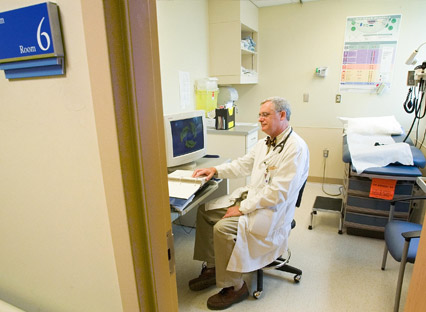How Google plans to detect heart attacks and cancer
Google is developing a pill containing nanoparticles and a wristband to diagnose diseases in the body

A free daily email with the biggest news stories of the day – and the best features from TheWeek.com
You are now subscribed
Your newsletter sign-up was successful
Google is developing a pill containing nanoparticles that can roam the human body to diagnose cancer or an impending heart attack.
The search giant announced its plans at a tech conference yesterday in a bid to find new partners for the project.
Dr Andrew Conrad, a molecular biologist who previously developed a cheap HIV test, is leading the project at the company's experimental research lab Google X, which has previously worked on self-driving cars and contact lenses for patients with diabetes. So how would the new technology work and does it pose any risks?
The Week
Escape your echo chamber. Get the facts behind the news, plus analysis from multiple perspectives.

Sign up for The Week's Free Newsletters
From our morning news briefing to a weekly Good News Newsletter, get the best of The Week delivered directly to your inbox.
From our morning news briefing to a weekly Good News Newsletter, get the best of The Week delivered directly to your inbox.
What is a nanoparticle?
It is a tiny piece of matter that can occur naturally or by design. The particles are so small they are measured in nanometres, one of which is one billionth of a metre, or one millionth of a millimetre.
What would Google use them for?
In theory, the user would ingest the nanoparticles, which would be programmed to attach themselves to any cancerous cells or fatty plaques that might cause a heart attack or stroke. Another type of nanoparticle might monitor chemicals in the blood to detect problems such as kidney disease, which is linked to high levels of potassium in the blood. Google wants to develop software, worn as a wristband, that could take readings from the nanoparticles via light and radio waves and make a diagnosis. Dr Conrad says the company's "dream" is that the system will be used for every test normally carried out by a doctor.
A free daily email with the biggest news stories of the day – and the best features from TheWeek.com
How long before it works?
Will Oremus at Slate says the word "dream" seems appropriate. "Intriguing as the concept is, there's an awful lot that still has to go right for Google to pull off something like this." The company has to develop the technology, but also faces a much higher regulatory bar than conventional diagnostic tools if users are to ingest it. Nevertheless, Google has employed 100 people from areas including astrophysics, chemistry and electrical engineering to work on the project. One radiology doctor advising the company says they are around five to seven years away from a product approved for use by doctors.
What are the drawbacks?
A pill that collects information from inside your body raises "maximum privacy concerns", says Tech Times. "Google is not exactly known for keeping its users' information private and was hugely criticised for handing over user information to US government agencies in previous years." Google insists it will not collect people's medical information or attempt to commercialise it, but simply license the technology to partners, enabling doctors and patients to use it as a medical device.
BBC health editor James Gallagher says Google will also have to address concerns around "false positives", when healthy people are told they are ill, as well as the issue of "over-diagnosis" when treatment is sometimes not needed despite a condition being discovered. "Screening the body for disease is littered with dangers," says Gallagher, "and if it is not done carefully, it could make hypochondriacs out of all of us."
-
 Health insurance: Premiums soar as ACA subsidies end
Health insurance: Premiums soar as ACA subsidies endFeature 1.4 million people have dropped coverage
-
 Anthropic: AI triggers the ‘SaaSpocalypse’
Anthropic: AI triggers the ‘SaaSpocalypse’Feature A grim reaper for software services?
-
 NIH director Bhattacharya tapped as acting CDC head
NIH director Bhattacharya tapped as acting CDC headSpeed Read Jay Bhattacharya, a critic of the CDC’s Covid-19 response, will now lead the Centers for Disease Control and Prevention
-
 Will AI kill the smartphone?
Will AI kill the smartphone?In The Spotlight OpenAI and Meta want to unseat the ‘Lennon and McCartney’ of the gadget era
-
 Has Google burst the Nvidia bubble?
Has Google burst the Nvidia bubble?Today’s Big Question The world’s most valuable company faces a challenge from Google, as companies eye up ‘more specialised’ and ‘less power-hungry’ alternatives
-
 How the online world relies on AWS cloud servers
How the online world relies on AWS cloud serversThe Explainer Chaos caused by Monday’s online outage shows that ‘when AWS sneezes, half the internet catches the flu’
-
 Is the UK government getting too close to Big Tech?
Is the UK government getting too close to Big Tech?Today’s Big Question US-UK tech pact, supported by Nvidia and OpenAI, is part of Silicon Valley drive to ‘lock in’ American AI with US allies
-
 Google: A monopoly past its prime?
Google: A monopoly past its prime?Feature Google’s antitrust case ends with a slap on the wrist as courts struggle to keep up with the tech industry’s rapid changes
-
 South Korea's divide over allowing Google Maps
South Korea's divide over allowing Google MapsTalking Points The country is one of few modern democracies where the app doesn't work
-
 Google avoids the worst in antitrust ruling
Google avoids the worst in antitrust rulingSpeed Read A federal judge rejected the government's request to break up Google
-
 Is AI killing the internet?
Is AI killing the internet?Talking Point AI-powered browsers and search engines are threatening the death of the open web